The global twin screw extruders market is forecasted to grow from USD 3.1 billion in 2025 to approximately USD 5.2 billion by 2035, recording an absolute increase of USD 2.10 billion over the forecast period. This translates into a total growth of 67.7%, with the market forecast to expand at a compound annual growth rate (CAGR) of 5.3% between 2025 and 2035. The market size is expected to grow by nearly 1.68X during the same period, supported by the rising demand for advanced polymer processing technologies and increasing applications across multiple industrial sectors.
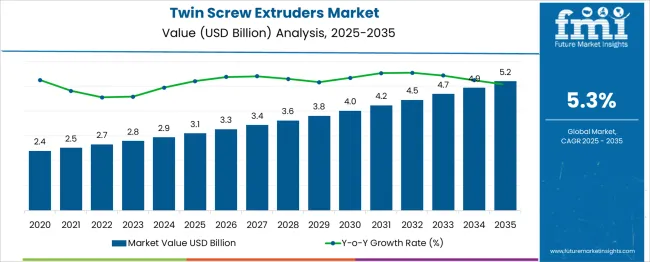
Between 2025 and 2030, the twin screw extruders market is projected to expand from USD 3.1 billion to USD 3.96 billion, resulting in a value increase of USD 860 million, which represents 40.9% of the total forecast growth for the decade. This phase of growth will be shaped by rising demand for high-performance polymer processing equipment, increasing adoption of advanced extrusion technologies in manufacturing operations, and growing focus on energy-efficient production methods. Equipment manufacturers are expanding their technological capabilities to address the evolving requirements of modern industrial processing applications.
From 2030 to 2035, the market is forecast to grow from USD 3.96 billion to USD 5.2 billion, adding another USD 1.24 billion, which constitutes 59.1% of the ten-year expansion. This period is expected to be characterized by widespread adoption of advanced automation technologies, integration of digital monitoring systems, and development of specialized twin screw configurations for emerging applications. The growing focus on eco-friendly manufacturing processes and circular economy principles will drive demand for more sophisticated extrusion equipment and specialized technical capabilities.
Between 2020 and 2025, the twin screw extruders market experienced steady development, driven by increasing industrial automation requirements and growing demand for precision polymer processing equipment. The market evolved as manufacturing facilities recognized the need for advanced extrusion technologies to meet quality standards and production efficiency targets. Industrial sectors began emphasizing specialized equipment capabilities to support diverse material processing requirements and complex manufacturing operations.
| Metric | Value |
|---|---|
| Estimated Value in (2025E) | USD 3.1 billion |
| Forecast Value in (2035F) | USD 5.2 billion |
| Forecast CAGR (2025 to 2035) | 5.3% |
Market expansion is being supported by the rapid increase in demand for advanced polymer processing capabilities across industrial sectors worldwide and the corresponding need for specialized twin screw extrusion equipment. Modern manufacturing operations rely on precise temperature control, material mixing, and processing consistency to ensure optimal product quality across diverse applications including plastics, food processing, pharmaceuticals, and chemical production. Advanced twin screw extruders provide superior mixing capabilities, enhanced processing control, and improved energy efficiency compared to traditional single screw alternatives.
The growing complexity of material formulations and increasing quality requirements are driving demand for professional twin screw extrusion equipment from certified manufacturers with appropriate technical capabilities and expertise. Industrial applications increasingly require precise control over processing parameters including temperature distribution, residence time, and material handling characteristics. Regulatory compliance and quality assurance standards are establishing specialized requirements for extrusion equipment that necessitate advanced technological features and comprehensive technical support capabilities.
The market is segmented by product type, end-use application, and region. By product type, the market is divided into co-rotating twin screw extruders and counter-rotating twin screw extruders. Based on end-use application, the market is categorized into plastic & polymer processing, food processing, pharmaceutical, chemical, rubber, and other applications. Regionally, the market is divided into China, India, Germany, France, United Kingdom, United States, and Brazil.
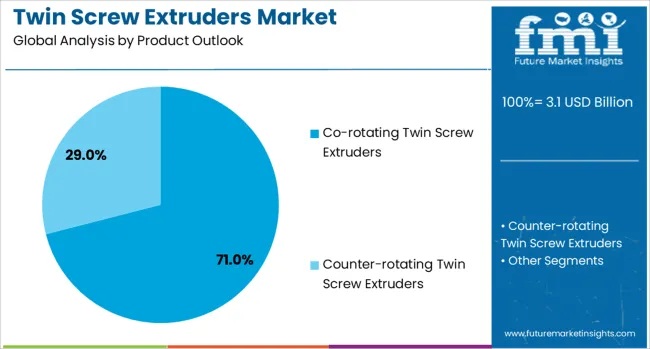
Co-rotating twin screw extruders are projected to account for 71% of the twin screw extruders market in 2025. This leading share is supported by the widespread adoption of this configuration for polymer compounding applications, which represent the majority of current industrial processing requirements. Co-rotating designs provide superior mixing performance, enhanced material handling capabilities, and improved processing flexibility, making them the preferred choice for most plastic and polymer processing operations. The segment benefits from established manufacturing capabilities and comprehensive equipment availability from multiple suppliers worldwide.
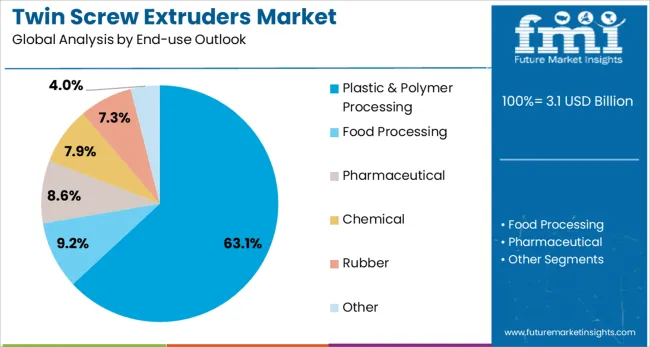
Plastic & polymer processing applications are expected to represent 63.1% of twin screw extruder demand in 2025. This dominant share reflects the high utilization of twin screw technology in polymer compounding, reactive extrusion, and advanced material processing operations. Modern plastic manufacturing increasingly features multiple processing requirements that demand sophisticated mixing, temperature control, and material handling capabilities. The segment benefits from growing demand for high-performance polymer materials and increasing requirements for specialized processing equipment across automotive, packaging, and industrial applications.
The twin screw extruders market is advancing steadily due to increasing industrial processing requirements and growing recognition of advanced extrusion technology benefits. The market faces challenges including high equipment investment costs, need for specialized technical expertise, and varying processing requirements across different industrial applications. Technological advancement programs and equipment standardization efforts continue to influence performance capabilities and market development patterns.
The growing deployment of automated control systems and digital monitoring technologies is enabling enhanced processing precision, reduced operational complexity, and improved production efficiency across industrial applications. Advanced automation systems equipped with real-time monitoring capabilities provide comprehensive process control while reducing manual intervention requirements and operational costs. These technologies are particularly valuable for high-volume manufacturing operations that require consistent processing parameters and comprehensive quality assurance documentation.
Modern twin screw extruder manufacturers are incorporating energy-efficient drive systems, optimized heating technologies, and advanced thermal management systems that improve operational efficiency and reduce processing costs. Integration of variable frequency drives, advanced temperature control systems, and optimized screw designs enables more precise processing control and comprehensive energy management capabilities. Advanced equipment configurations support processing of next-generation materials including bio-based polymers and advanced composite formulations.
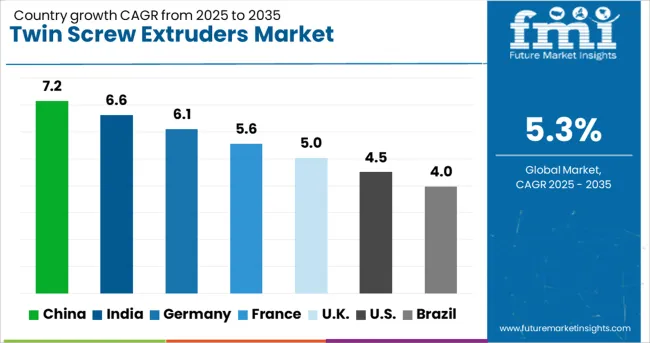
| Country | CAGR (2025-2035) |
|---|---|
| China | 7.1% |
| India | 6.6% |
| Germany | 6.1% |
| France | 5.6% |
| United Kingdom | 5% |
| United States | 4.5% |
| Brazil | 4% |
The twin screw extruders market is experiencing robust growth globally, with China leading at a 7.1% CAGR through 2035, driven by rapid expansion of polymer processing industries, industrial modernization programs, and increasing demand for advanced manufacturing equipment. India follows closely at 6.6%, supported by growing industrial development, technology adoption programs, and expanding manufacturing capabilities across diverse sectors. Germany shows strong growth at 6 %, emphasizing precision engineering excellence, advanced equipment integration, and stringent quality standards for processing technologies. France records 5.5%, focusing on advanced manufacturing technologies, industrial process optimization, and comprehensive equipment modernization initiatives. The United Kingdom demonstrates 5 % growth, prioritizing technological innovation, quality processing capabilities, and comprehensive manufacturing standards. The United States shows 4.5% expansion, emphasizing industrial efficiency optimization, process optimization, and standardized processing capabilities across manufacturing networks. Brazil maintains steady growth at 3.9%, driven by industrial modernization initiatives, advanced processing technology adoption, and comprehensive manufacturing capability development.
The report covers an in-depth analysis of 40+ countries; top-performing countries are highlighted below.
Revenue from twin screw extruders in China is projected at a CAGR of 7.1%, driven by rapid expansion of polymer processing industries and increasing demand for advanced manufacturing equipment. The country's expanding industrial base and growing focus on production efficiency are creating substantial demand for sophisticated extrusion technologies. Major manufacturing facilities and processing companies are establishing comprehensive equipment capabilities to support the growing requirements of domestic and export markets across multiple industrial sectors. China's industrial modernization programs are supporting development of specialized manufacturing capabilities that enhance equipment utilization and technical expertise across processing networks.
Revenue from twin screw extruders in India is expanding at a CAGR of 6.6%, supported by increasing industrial processing capabilities and growing demand for advanced manufacturing equipment. The country's developing industrial infrastructure and increasing focus on quality production methods are driving demand for professional extrusion technologies. Manufacturing facilities and processing companies are gradually establishing capabilities to serve the growing requirements of diverse industrial applications across polymer, food, and pharmaceutical sectors. India's industrial growth initiatives and technology adoption programs are creating opportunities for specialized equipment suppliers that can support diverse processing technologies and manufacturing requirements.
Demand for twin screw extruders in Germany is projected at a CAGR of 6 %, supported by the country's focus on precision manufacturing and advanced engineering capabilities. German industrial facilities are implementing comprehensive extrusion capabilities that meet stringent quality standards and technical specifications. The market is characterized by focus on technological innovation, advanced equipment integration, and compliance with comprehensive industrial quality regulations. Germany's manufacturing industry investments prioritize advanced processing technologies that demonstrate superior precision and reliability while meeting European quality and safety standards.
Demand for twin screw extruders in France is expanding at a CAGR of 5.5%, driven by increasing focus on advanced manufacturing technologies and industrial process optimization. French manufacturing facilities are implementing comprehensive processing capabilities to serve diverse applications across polymer, food, and chemical sectors. The market benefits from established industrial infrastructure and comprehensive technical support capabilities that enable sophisticated processing operations. France's industrial development programs focus on technological advancement and equipment modernization initiatives that enhance processing capabilities and operational efficiency.
Demand for twin screw extruders in the United Kingdom is projected at a CAGR of 5 %, supported by focus on technological innovation and advanced processing capabilities. British manufacturing facilities are establishing comprehensive extrusion capabilities that meet stringent quality requirements and industrial specifications. The market is characterized by focus on process optimization, advanced equipment integration, and compliance with comprehensive manufacturing standards. The UK's manufacturing sector investments prioritize advanced processing technologies that support diverse industrial applications while maintaining operational efficiency and quality consistency.
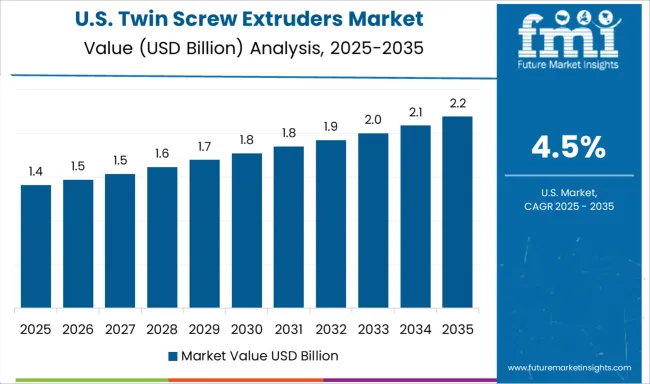
Demand for twin screw extruders in the United States is expanding at a CAGR of 4.5%, driven by increasing focus on industrial efficiency and advanced manufacturing processes. Large manufacturing networks and processing facilities are establishing comprehensive extrusion capabilities to serve diverse industrial requirements. The market benefits from established equipment supplier networks and comprehensive technical support infrastructure that enables consistent processing quality and operational reliability. American industrial consolidation trends enable standardized processing capabilities across multiple locations, providing consistent equipment performance and comprehensive technical coverage throughout regional markets.
Revenue from twin screw extruders in Brazil is growing at a CAGR of 3.9%, driven by increasing industrial processing capabilities and growing recognition of advanced extrusion technology benefits. The country's established manufacturing infrastructure is gradually integrating advanced processing equipment to serve modern industrial applications. Processing facilities and manufacturing companies are investing in sophisticated extrusion technologies to address growing market demand across polymer, food, and chemical sectors. Brazil's industrial modernization initiatives facilitate adoption of advanced processing technologies that support comprehensive manufacturing capabilities across major metropolitan and industrial regions.
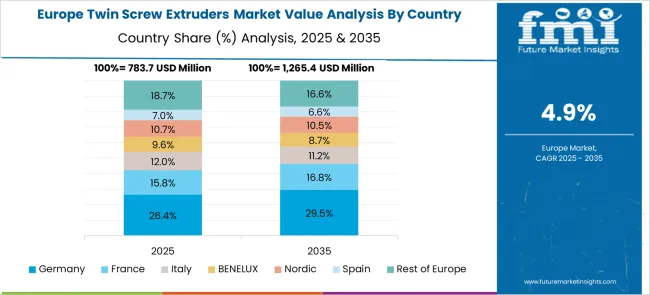
The Twin Screw Extruders market in Europe is projected to reach USD 16.695 billion in 2025, with Germany leading the regional market at USD 6.095 billion, representing 36.5% of European demand. France follows with USD 5.565 billion, accounting for 33.3% of the regional market, while the United Kingdom contributes USD 5.035 billion, representing 30.2% of European twin screw extruders consumption. The European market demonstrates strong focus on precision engineering and advanced processing technologies, particularly in polymer compounding and pharmaceutical applications. Germany's leadership position reflects its robust automotive plastics sector and advanced manufacturing capabilities, while France's substantial market share indicates significant investment in food processing and chemical applications. The United Kingdom maintains a strong position through its focus on pharmaceutical processing and specialized technology development programs.
European twin screw extruders demand patterns show concentration in high-technology applications, with co-rotating configurations representing the dominant product segment across all three major markets. The region's stringent quality standards and advanced manufacturing requirements drive preference for precision-engineered equipment, supporting premium technology adoption and specialized supplier relationships. Germany's automotive and chemical processing clusters, France's food and pharmaceutical applications, and the United Kingdom's specialized processing activities collectively establish Europe as a critical market for advanced twin screw extrusion technologies. Regional supply chain integration and technical expertise development continue to strengthen European market position in global polymer processing and specialized manufacturing applications.
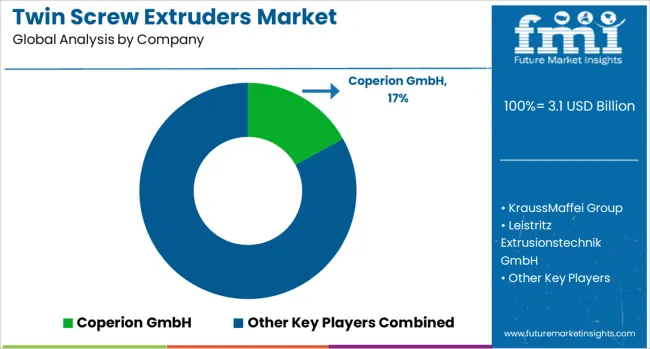
The twin screw extruders market is defined by competition among specialized equipment manufacturers, industrial machinery companies, and processing technology providers. Companies are investing in advanced screw designs, automated control systems, energy-efficient technologies, and comprehensive technical support to deliver precise, reliable, and cost-effective extrusion solutions. Strategic partnerships, technological innovation, and global market expansion are central to strengthening equipment portfolios and market presence.
Coperion GmbH, Germany-based, offers advanced twin screw extrusion systems with focus on precision engineering, comprehensive automation, and specialized technical expertise. KraussMaffei , operating globally, provides comprehensive extrusion solutions integrated with advanced processing technologies and digital control systems. Leistritz Extrusionstechnik GmbH, Germany, delivers technologically advanced processing equipment with standardized configurations and specialized applications. Japan Steel Works Ltd, Japan, emphasizes precision manufacturing and comprehensive technical support for industrial processing applications.
Bühler Group, Switzerland, offers comprehensive processing solutions integrated with advanced automation and quality control systems. Milacron, Baker Perkins, Battenfeld-Cincinnati, and CPM Extrusion Group provide specialized extrusion expertise, standardized equipment configurations, and comprehensive technical support across global and regional markets. Nanjing Jieya Extrusion Equipment Co., Ltd, ICMA San Giorgio, Bausano S.p.A, Thermo Fisher Scientific Inc., WENGER MANUFACTURING, and Xtrutech Ltd. offer specialized processing capabilities, advanced technical solutions, and equipment reliability across diverse industrial applications.
| Item | Value |
|---|---|
| Quantitative Units | USD 5.2 billion |
| Product Type | Co-rotating Twin Screw Extruders, Counter-rotating Twin Screw Extruders |
| End-use Application | Plastic & Polymer Processing, Food Processing, Pharmaceutical, Chemical, Rubber, and Others |
| Regions Covered | North America, Europe, East Asia, South Asia & Pacific, Latin America, Middle East & Africa |
| Countries Covered | United States, Canada, United Kingdom, Germany, France, China, Japan, South Korea, India, Brazil, Australia and 40+ countries |
| Key Companies Profiled | Coperion GmbH, KraussMaffei, Leistritz Extrusionstechnik GmbH, Japan Steel Works Ltd, Bühler Group, Milacron, Baker Perkins, Battenfeld-Cincinnati, CPM Extrusion Group, Nanjing Jieya Extrusion Equipment Co., Ltd., ICMA San Giorgio, Bausano S.p.A, Thermo Fisher Scientific Inc., WENGER MANUFACTURING, Xtrutech Ltd. |
| Additional Attributes | Dollar sales by product type and end-use application, regional demand trends across major markets, competitive landscape with established manufacturers and emerging suppliers, industrial preferences for advanced versus conventional processing technologies, integration with digital control systems and automation platforms, innovations in screw design and energy-efficient processing capabilities, and adoption of specialized configurations for diverse industrial applications. |
The global twin screw extruders market is estimated to be valued at USD 3.1 billion in 2025.
The market size for the twin screw extruders market is projected to reach USD 5.2 billion by 2035.
The twin screw extruders market is expected to grow at a 5.3% CAGR between 2025 and 2035.
The key product types in twin screw extruders market are co-rotating twin screw extruders and counter-rotating twin screw extruders.
In terms of end-use outlook, plastic & polymer processing segment to command 63.1% share in the twin screw extruders market in 2025.






Our Research Products

The "Full Research Suite" delivers actionable market intel, deep dives on markets or technologies, so clients act faster, cut risk, and unlock growth.

The Leaderboard benchmarks and ranks top vendors, classifying them as Established Leaders, Leading Challengers, or Disruptors & Challengers.

Locates where complements amplify value and substitutes erode it, forecasting net impact by horizon

We deliver granular, decision-grade intel: market sizing, 5-year forecasts, pricing, adoption, usage, revenue, and operational KPIs—plus competitor tracking, regulation, and value chains—across 60 countries broadly.

Spot the shifts before they hit your P&L. We track inflection points, adoption curves, pricing moves, and ecosystem plays to show where demand is heading, why it is changing, and what to do next across high-growth markets and disruptive tech

Real-time reads of user behavior. We track shifting priorities, perceptions of today’s and next-gen services, and provider experience, then pace how fast tech moves from trial to adoption, blending buyer, consumer, and channel inputs with social signals (#WhySwitch, #UX).

Partner with our analyst team to build a custom report designed around your business priorities. From analysing market trends to assessing competitors or crafting bespoke datasets, we tailor insights to your needs.
Supplier Intelligence
Discovery & Profiling
Capacity & Footprint
Performance & Risk
Compliance & Governance
Commercial Readiness
Who Supplies Whom
Scorecards & Shortlists
Playbooks & Docs
Category Intelligence
Definition & Scope
Demand & Use Cases
Cost Drivers
Market Structure
Supply Chain Map
Trade & Policy
Operating Norms
Deliverables
Buyer Intelligence
Account Basics
Spend & Scope
Procurement Model
Vendor Requirements
Terms & Policies
Entry Strategy
Pain Points & Triggers
Outputs
Pricing Analysis
Benchmarks
Trends
Should-Cost
Indexation
Landed Cost
Commercial Terms
Deliverables
Brand Analysis
Positioning & Value Prop
Share & Presence
Customer Evidence
Go-to-Market
Digital & Reputation
Compliance & Trust
KPIs & Gaps
Outputs
Full Research Suite comprises of:
Market outlook & trends analysis
Interviews & case studies
Strategic recommendations
Vendor profiles & capabilities analysis
5-year forecasts
8 regions and 60+ country-level data splits
Market segment data splits
12 months of continuous data updates
DELIVERED AS:
PDF EXCEL ONLINE
Twin Neck Bottles Market Size and Share Forecast Outlook 2025 to 2035
Twin Seal Bags Market Size and Share Forecast Outlook 2025 to 2035
Twin Neck Dosing Bottles Market Size and Share Forecast Outlook 2025 to 2035
Twin Pouch Packaging Market
Digital Twins Technologies Market Size and Share Forecast Outlook 2025 to 2035
Digital Twin In Logistics Market Size and Share Forecast Outlook 2025 to 2035
Digital Twin Technology Market Size and Share Forecast Outlook 2025 to 2035
Digital Twin Packaging Line Market Size and Share Forecast Outlook 2025 to 2035
Electrical Digital Twin Market Growth – Trends & Forecast 2025 to 2035
Screw Conveyor Market Size and Share Forecast Outlook 2025 to 2035
Screw Compressor Market Size and Share Forecast Outlook 2025 to 2035
Screw Capping Machine Market Size and Share Forecast Outlook 2025 to 2035
Screwdriver Market Size and Share Forecast Outlook 2025 to 2035
Screw Top Jar Market Insight - Growth & Trends to 2025 to 2025
Key Players & Market Share in Screw Conveyor Industry
Screw Air End Market Growth – Trends & Forecast 2024-2034
Screw Jacks Market
Screw Top Lids Market
Screw Top Pails Market
Leadscrew Market

Thank you!
You will receive an email from our Business Development Manager. Please be sure to check your SPAM/JUNK folder too.
Chat With
MaRIA